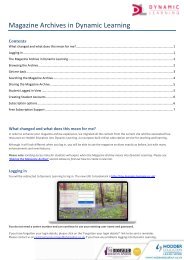POWER
OCR-A-Power-sample-chapter
OCR-A-Power-sample-chapter
Create successful ePaper yourself
Turn your PDF publications into a flip-book with our unique Google optimized e-Paper software.
Prologue: The historian’s mind-set<br />
How historians work<br />
If you think that history means reading a lot of information from a textbook and then<br />
memorising it all, you are wrong. If you try to learn history in this way, you will<br />
probably end up feeling a bit like the picture above!<br />
Even historians get overwhelmed by the amount of historical information to be found<br />
in books, archives and other sources. They use a range of techniques to help them make<br />
sense of it all.<br />
Focus<br />
No historian can study every aspect of a period of history. To make the subject<br />
manageable, historians focus on particular areas. This book does the same – each of the<br />
studies focuses on selected parts of the story. In doing so we miss out other historical<br />
information, such as science and technology or the economy.<br />
Ask questions<br />
Historians are investigators rather than just collectors of information. They search<br />
for new information about the past in order to tackle important questions.<br />
Historians have different interests. They do not all investigate<br />
the same questions. So when studying the Norman Conquest,<br />
for example, Historian A may be most interested in why the<br />
Normans succeeded in conquering England, while Historian B<br />
concentrates on how big an impact the Norman Conquest had.<br />
A bit like two different builders, they use the same or similar<br />
materials but they ask different questions and tell different stories.<br />
You will follow the same sort of process when preparing for your<br />
history exam. You need to learn the content of the specification,<br />
but you also need to practise using this content to answer important<br />
questions. The text in this book, as well as the Key Questions and<br />
Focus Tasks for each topic, are designed to help you think in this way.<br />
Uncorrected proof<br />
Select<br />
Another vital technique that historians use<br />
is selection. From all the material they study,<br />
historians must select just the parts that are<br />
relevant and useful to answer a question.<br />
Selection is hard for a historian, but it may be<br />
even harder for you under the time pressure of an<br />
exam. You have learnt a lot of history facts and<br />
you want to show the examiner how much you<br />
know – but this is the wrong way of thinking. To<br />
begin with, you risk running out of time. Even<br />
more serious, you may end up not answering the<br />
question clearly because you have included things<br />
that are not relevant or helpful. Compare this<br />
process to a wardrobe full of clothes. You never<br />
wake up in the morning and put on every item<br />
of clothing you own! You choose what to wear<br />
depending on different factors:<br />
the weather<br />
•<br />
what you will be doing that day (going to school, a wedding,<br />
a Saturday job, a sports match).<br />
Selecting information carefully will make your writing more focused<br />
and relevant. Thinking carefully about each fact as you select what<br />
is relevant and reject what it not will also help you remember the<br />
information.<br />
Organise<br />
Once historians have selected the relevant information, they then have<br />
to choose what order to present it in to create a coherent argument. You<br />
must do the same. If you were responding to the question ‘Why did<br />
some women get the vote in 1918?’, you need to do more than simply list<br />
all the reasons. You must build an argument that shows what you think<br />
is the most important reason. Listing all the events that led up to some<br />
women being given the vote in 1918 does not necessarily explain why<br />
they were given it. You need to link the events to the outcomes.<br />
Fine tune<br />
But don’t stop there. Even the most skilled historians<br />
make mistakes when they write and you might, too.<br />
When you have finished writing, re-read your text and<br />
fine tune it to make it as clear and accurate as possible.<br />
When you are about to go out, what is the last thing you<br />
do before you leave the house? Check your hair? Check<br />
your makeup? That is fine tuning. It is a history skill<br />
too, and could make a real difference to how much an<br />
examiner enjoys reading what you write.<br />
So remember:<br />
focus<br />
ask questions<br />
select<br />
• organise<br />
fine tune.<br />
Keep these points in mind as you work through your<br />
course. Good luck!<br />
5




